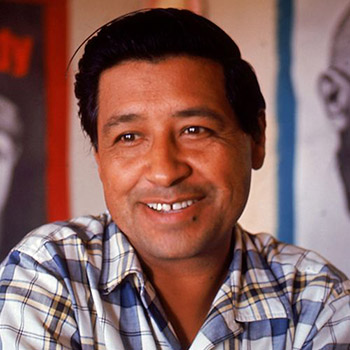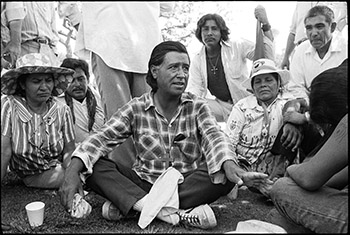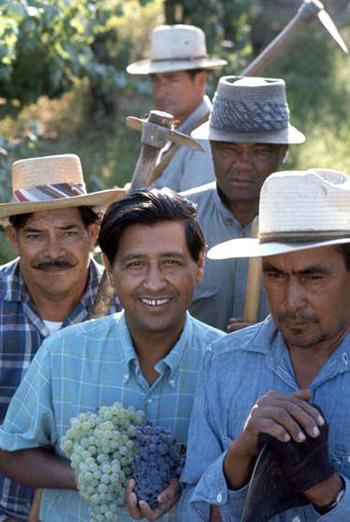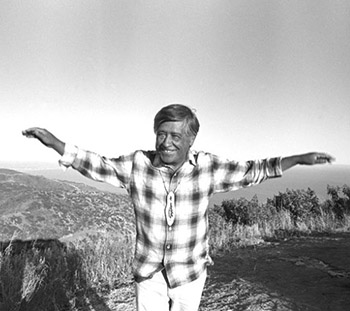
Honoring César Chávez
Cesar Chavez
March 31, 1927 – April 23, 1993
Cesar Chavez was a Mexican American labor leader and civil rights activist who dedicated his life’s work to what he called la causa (the cause): the struggle of farm workers in the United States to improve their working and living conditions through organizing and negotiating contracts with their employers. Committed to the tactics of nonviolent resistance practiced by Mahatma Gandhi and Martin Luther King Jr., Chavez founded the National Farm Workers Association (later the United Farm Workers of America) and won important victories to raise pay and improve working conditions for farm workers in the late 1960s and 1970s.
A Proclamation on César Chávez Day, 2023
Today, we honor César E. Chávez by carrying on the cause — “La Causa” — to which he dedicated his life: championing the dignity and rights of every worker, using nonviolence to fight for justice, and standing with organized labor to build an economy that rewards work and not just wealth.
César E. Chávez came of age picking produce and cotton in the fields of California. He labored in intense heat, all too familiar with the harms of poisonous pesticides. And he learned early on about the power of organizing for basic dignity and respect through his work with Fred Ross and the Community Service Organization. Working alongside trailblazing labor activist Dolores Huerta and inspired by heroes like Dr. Martin Luther King, Jr. and Mahatma Gandhi, he founded the United Farm Workers of America in 1962. Over the following three decades, Chávez marched, fasted, and boycotted — campaigning for collective bargaining rights, a minimum wage, unemployment insurance, and better health and safety standards for his fellow workers. His courage opened America’s eyes to injustice and ushered in a new age of opportunity for farm workers and the working class.
On what would be his 96th birthday, Chávez’s life and legacy as a leader of the labor and civil rights movements continue to guide our efforts to grow our economy from the bottom up and the middle out — fighting every day for America’s working class. My Administration is creating good-paying jobs, protecting the retirement savings of millions of union workers, pushing to ban unfair non-compete agreements, and strengthening workers’ rights to organize. Since I took office, the Department of Labor has recovered $16.3 million in back pay and damages — compensation employers owed to their employees — for nearly 20,000 farmworkers. This hard-earned money can mean a worker’s ability to pay rent, buy groceries, or save for their children’s futures.
The Department of Labor is also working on new rules to protect workers from extreme heat in the workplace, and it is conducting inspections in industries with high incidences of heat-related illnesses or deaths. Meanwhile, the Department of Agriculture has provided hundreds of millions of dollars in financial assistance to farmworkers and meatpacking workers for expenses incurred due to the COVID-19 pandemic. It has also helped agricultural employers to implement more robust health and safety standards.
There is more work to do. That is why I continue to call for paid sick leave for every worker in America; for stronger organizing and collective bargaining rights; and for better conditions for people who work on farms, on ranches, and across the food and agricultural industry. I encourage the Congress to pass the Protecting the Right to Organize Act. I also encourage the Congress to pass the Farm Workforce Modernization Act to create a pathway to citizenship for farmworkers, who put food on our tables and sustain our Nation.
This César Chávez Day, as we celebrate an American hero, let us be united in our efforts to stand up for the dignity and rights of all workers. I proudly keep a bust of César E. Chávez in the Oval Office, which reminds me daily of my commitment to the Latino community and to the American people. The First Lady has honored his legacy with the Chávez family in Keene and Delano, California, home of Chávez’s movement. I want to ensure the American Dream is within reach of all who live in our Nation, not just because it is right for our economy, but because it is the right thing to do for humanity. In Chávez’s own words, “The love for justice that is in us is not only the best part of our being, but it is also the most true to our nature.”
NOW, THEREFORE, I, JOSEPH R. BIDEN JR., President of the United States of America, by virtue of the authority vested in me by the Constitution and the laws of the United States, do hereby proclaim March 31, 2023, as César Chávez Day. I call upon all Americans to observe this day as a day of service and learning, with appropriate service, community, and education programs to honor César E. Chávez’s enduring legacy.
IN WITNESS WHEREOF, I have hereunto set my hand this
thirtieth day of March, in the year of our Lord two thousand twenty-three, and of the Independence of the United States of America the two hundred and forty-seventh.
JOSEPH R. BIDEN JR.
Governor Gavin Newsom today issued a proclamation declaring March 31, 2023, as “César Chávez Day” in the State of California.
PROCLAMATION
Throughout his life of work and service, César Chávez empowered thousands to stand together for their rights and led our nation toward a more equitable and just society. His visionary leadership inspired a powerful movement that burns brightly to this day, rallying people from all walks of life to champion the dignity of work.
Born near Yuma, Arizona in 1927, Chávez and his family moved to California after losing their home during the Great Depression. Toiling in the fields from a young age, Chávez faced dismal working conditions, racism, abuse, and exploitation. Moved to confront these injustices, he began working as an organizer in the farmworker community, advocating for improvements in their working and living conditions.
Founding the United Farm Workers together with Dolores Huerta, Chávez challenged Americans to recognize that the produce on their dinner tables was picked by people who were being denied the most basic human rights. Chávez led a historic march of farmworkers from Delano to Sacramento in 1966 and helped launch a successful boycott of grapes that galvanized support across the country. His tireless efforts were instrumental in the passage of the 1975 California Agricultural Labor Relations Act, which made our state the first in U.S. history to give farmworkers the right to join a union.
Chávez’s legacy is at the forefront of our minds in the wake of devastating climate impacts that have taken a hard toll on farmworking communities. California has taken important actions to support farmworkers, including expanding farmworker union rights and worker protections, the development and preservation of farmworker housing, creating farmworker resource centers, and investing in new protections from climate risks. California has also advocated for Congress to provide a pathway to citizenship, while making state investments to address barriers related to immigration status that also impact many farmworkers, including access to health care, food assistance for immigrants over the age of 55, free immigration services, and anti-poverty programs. These actions have been critical, and our support for farmworkers continues, including ongoing efforts to assist undocumented workers and communities affected by recent storms.
On the anniversary of his birth, we celebrate César Chávez’s hard-won strides for social justice, and reflect on the work that lies ahead to build a brighter future for all our communities. Let us carry on his timeless legacy by lifting up our neighbors, speaking out against injustice, and working together to extend the dream of prosperity, equity and progress to all.
NOW THEREFORE I, GAVIN NEWSOM, Governor of the State of California, do hereby proclaim March 31, 2023, as ” César Chávez Day.”
GAVIN NEWSOMGovernor of California
ATTEST:SHIRLEY N. WEBER, Ph.D.Secretary of State

Once social change begins, it cannot be reversed. You cannot un-educate the person who has learned to read. You cannot humiliate the person who feels pride. You cannot oppress the people who are not afraid anymore.

To make a great dream come true, the first requirement is a great capacity to dream; the second is persistence.

The fight is never about grapes or lettuce. It is always about people.

History will judge societies and governments – and their institutions – not by how big they are or how well they serve the rich and the powerful, but by how effectively they respond to the needs of the poor and the helpless.

Never, never is it possible to reach someone if you become angry or bitter. Only love and gentleness can do it.

César Chávez Day is a day to honor the legacy of one of the most important civil rights leaders in American history. Chávez was a labor leader and activist who fought for the rights of farm workers in California and across the United States. He founded the United Farm Workers (UFW) union and led efforts in support of better wages, working conditions, and protections for agricultural workers.
As a daughter of parents who were farmworkers, Chávez’s work and affirmation that the true purpose of education is service to others deeply resonates with me. Despite his limited education, he inspired a movement that fostered activism for those whose labor provides sustenance for our communities. I take pride in knowing that at Pacifica Graduate Institute, we are committed to social justice and community activism. We believe in the power of individuals and communities to affect positive change in the world.Chávez’s life and work serve as an inspiration to continue working toward a more just and equitable society.
Pacifica values the relationship between the psyche and society, two aspects seen in Chávez’s work. His work was rooted in the belief that individuals are deeply connected to the communities and social systems in which they live and work. He recognized the importance of collective action in creating social change and worked tirelessly to build a movement that could bring about lasting transformation.
As an Institute that equips learners to serve the world, we train mental health professionals, educators, and leaders, to approach their work with a sense of social responsibility. We encourage our learners to explore the intersections between psychology, culture, and politics and to consider how they can use their knowledge and skills to promote social and ecological change. We encourage our learners to explore how social and cultural forces shape individual and collective psyches.
We are immensely proud of the work our learners, faculty, staff, and alumni do in their communities and their research. To note just a few of many such examples from our community that align with the life and activism of César Chávez:
- The Fieldwork & Research from our Community, Liberation, Indigenous, & Eco-psychologies Specialization
- Dissertation Oral Defenses from Pacifica doctoral students related to social justice causes and fighting for the liberation of oppressed or underserved populations, including:
• An upcoming dissertation defense from Claudia Alvarez-Roddy (DPT student) on “The Gateway Toward Healing for Formerly Incarcerated Latino Men”
• A recent defense by Fujika Ariarakawa (CLIE student) on An Urgency for Okinawa/Ryūkyū Liberation Psychology: A Study of the Psychological Phenomena of Ongoing Violence in Okinawa and the Development of an Okinawa/Ryūkyū Liberation Psychology Method
- We also encourage you to explore our Diversity Library Guide to explore reference sources, books, articles, and journals related to diversity, equity, and inclusion
I join with the Pacifica community in celebrating the legacy of César Chávez and the reminder of the importance of community activism and the need for individuals to come together to effect positive change. We are proud to honor the legacy of César Chávez and to continue tending the soul of the world by working towards building a more just and sustainable society. We are committed to continuing his legacy of community-based activism and preparing our learners to be agents of change in the world.




